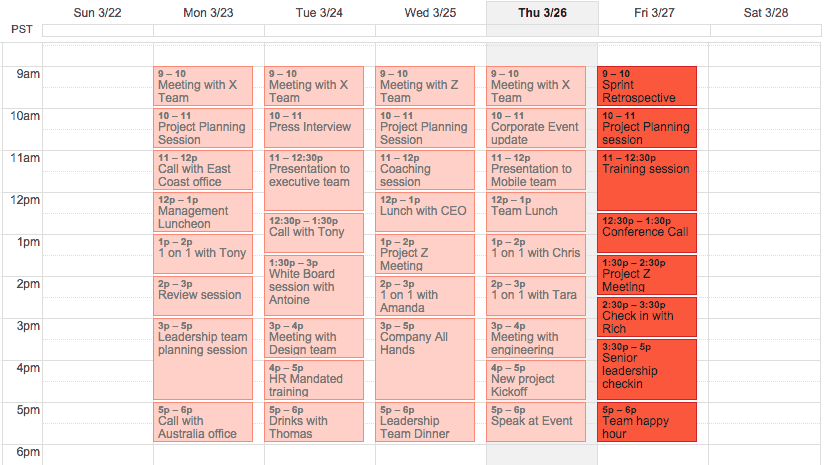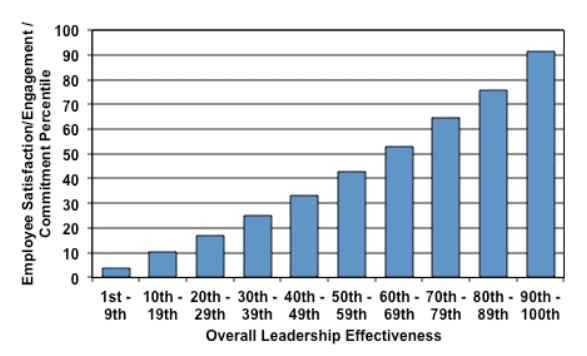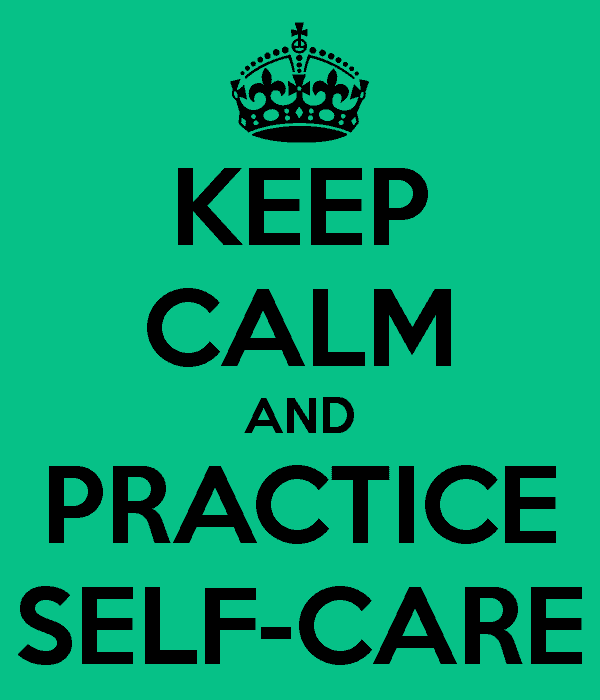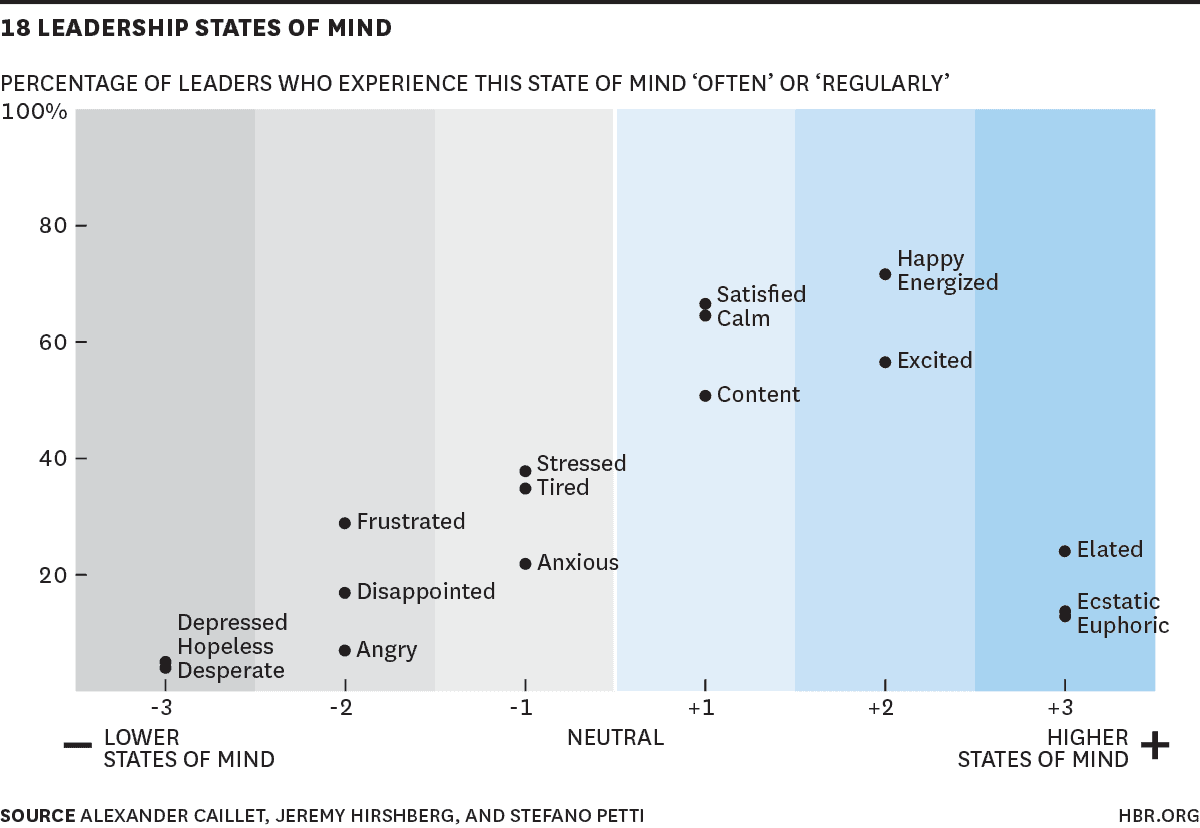When you hear "Lebron James,” you think superstar athlete. But, how about high performing leader?
Rarely do people make the connection between James and big tech CEOs like Jeff Bezos and Brian Chesky. However, Fortune Magazine highlighted all of these men in their 2017's World's Greatest Leaders list.
The magazine realized that they shared a common trait: they invested in themselves first and foremost.
Consistent, high performance takes effort and focus.
Habits coach Brendon Burchard defines high-performance as, "[the ability to succeed] above and beyond standard norms over the long-term.”
High performing leaders achieve great success in even extraordinary circumstances. They master their mind, emotions, and time to get the best out of themselves and their team.
Former Olympic and NBA championship teammate Richard Jefferson told ESPN about Lebron James's growth mindset:
"He never wants to feel comfortable; he always wants to feel uncomfortable. And I think that's what pushes him, that's part of the reason why he's so great is that he's never in a mode like, 'OK, this is a good place to be.'
He's, you know, 'OK, where can I go next? Where can I go next? I have to keep pushing and striving for another level of greatness.' Because he knows that that's [the] only way to achieve what he wants to achieve."
James seeks constant improvement.
According to legendary tennis coach Bob Brett, one trait separates average players from sports champions.
In an interview with Rotman Magazine, Brett claims that high performing leaders like James are pushing themselves beyond expectations to strengthen their skills.
Interestingly, Brett noticed the same dedication in business executives:
"In life, you're going to hit a lot of walls. When the best performers hit a wall, they see it as an opportunity to learn and grow. In business, on the long and complicated road up, if you aren't a learner, you won't get very far.”
But unlike athletes, senior leaders don't have off-seasons. You're expected to perform at your best 8+ hours a day, 5-7 days a week, for decades.
This pressure can be exhausting. However, if you adopt the effective coping and growth strategies from elite athletes, you can better maintain and improve your work to become a high performing leader, too.
Avoid the Burnout Epidemic
"Employee burnout has reached epidemic proportions,” said Charlie DeWitt, the VP of business development at Kronos.
Last year, Kronos's survey claimed that almost half of HR managers blame burnout for a good portion of their annual workforce turnover.
The American Psychological Association (APA) revealed that job stress cost U.S. businesses about $300 billion per year, "through absenteeism, diminished productivity, employee turnover and direct medical, legal and insurance fees.”
This is why the World Health Organisation (WHO) has called work burnout as the "health epidemic of the 21st century.”
Sadly, managers and leaders are the ones most likely to suffer burnout. The article, "When Executives Burnout," explains that managers and CEOs have a lot of important, but stressful duties contributing to it:
- Establish goals and prioritizes
- Accept and deflect hostility
- Resolve employee conflicts
- Tolerate insensitive personalities
- Improve brand reputation
A CEO of an electric company confessed his frustrations after a scandal put him in the center of many challenges:
"In my present role, I'm the guy who catches it all. I can't seem to get people to stand still and listen, and I can't continue to take all the hostility that goes with it—the crank calls, being woken up late at night and called names. I don't know how much longer I can last in this job.”
Examples like this are why leadership roles are often called, "the loneliest in the business.”
Leaders need a break.
When leaders can't handle stress, they tend to lash out at their employees. These negative attitudes kill their chances of becoming high performing leaders, and creates a cycle of reactive management.
This graph shows a positive correlation between employee engagement and supervisor effectiveness.
As you can see, low employee satisfaction, engagement, and commitment are directly correlated to having a poor manager. Meanwhile, great leaders appear to lead happier, more engaged employees.
How can these exhausted managers change for the better? Like their workers, they're victims of intense demands.
The solution then is transforming how managers prioritize their well-being.
Get in The Zone
Most managers don't see themselves as athletes, but you should.
In the article, "The Making of a Corporate Athlete,” performance experts Jim Loehr and Tony Schwartz argue that executives have the same (if not, higher) work demands as athletes. Both desire to maintain high-performance in extreme and changing circumstances.
However, only one group seeks to maintain and increase its ideal performance state (IPS).
In "The Zone: Evidence of a Universal Phenomenon for Athletes Across Sports,” researchers defined IPS as:
"a state in which an athlete performs to the best of his or her ability. It is a magical and…special place where performance is exceptional and consistent, automatic and flowing. An athlete [can] ignore all the pressures and let his or her body deliver the performance that has been learned so well. Competition is fun and exciting."
The study surveyed 59 athletes from a variety of sports and concluded that they all performed best when they were in IPS or "the zone.” They felt confident, focused, and relaxed even during intense pressure.
If they can reach IPS, high performing leaders can also work at their best.
However, most managers will never achieve such a state as they fail to properly care for their well-being.
High performing leaders take care of themselves
In "The Making of a Corporate Athlete,” Loehr and Schwartz state that high performing leaders take care of their body, emotions, mind, and spirit. Starting with yourself is essential to your success.
For example, former teammate Mike Miller revealed that Lebron James treats his health as an investment:
"He puts a lot of money behind taking care of his body. A lot of people think it's a big expense, but that big expense has allowed him to make a lot more money for a long period."
James reportedly gets massages, takes ice baths, and receive electro-stimulation. He knows that he can only perform at the level his body allows, so he makes sure that it's in the best shape.
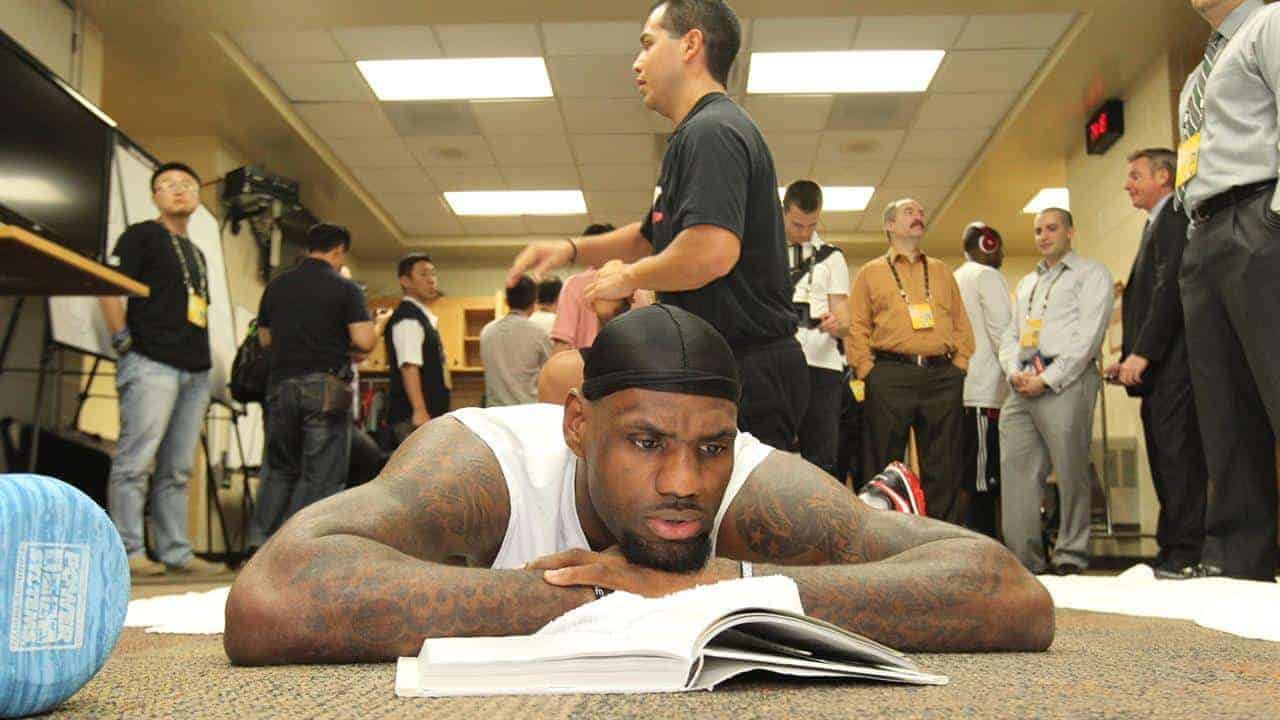
However, this is only part of his competitive edge. He told reporters at TD Garden that he prepares mentally for games:
"I put a lot of work into the physical side and take care of my body, but it is all mental to me. I understand exactly what is going on in the course of a game from both teams.
That means understanding what we want to do and they want to do and things of that nature. It's 90 percent mental for me.”
Lebron's performance rituals help him become a better leader. When he takes care of himself, he gets into ISP faster.
LeBron is in good company.
Many other athletes similarly make major investments in their health and well being. For example, James Harrison is almost 40 but he has continued to perform well in after returning from retirement. A rarity in sports.
Even the younger players on his team struggle to keep up with his legendary Instagram workouts.
How did this "old man” overshadow his younger teammates? By spending over $350,000 per year on "body work."
Harrison told, NFL Network's Andrea Kremer, that "body work” consists of paying:
- An acupuncturist
- A dry-needling person
- A trainer
- A doctor
- A masseuse
- A physio-chiro masseur
Inspired by Tom Brady's desire to play well into his 40s, fellow NFL quarterback Aaron Rodgers adopted Brady's diet plan, so he could also play football in his 40s.
He told ESPN that he dropped dairy for a more vegan-like diet and he limits his meat intake. He also prioritizes recovery by scheduling eight hours of sleep a night. Rodgers told SI that, "Nutrition and flexibility are things that will keep me playing at a high level into my 40s."
Stable leaders have teams that perform better
Like Harrison and Rodgers, high performing leaders invest in improving their overall welfare. Because when you're happier, you perform better.
When managers are happier, they tend to treat their employees better, increasing the likelihood of project success.
In "Manager emotional intelligence and project success: The mediating role of job satisfaction and trust,” researchers tried to determine the effects of manager attitudes on complex projects.
They hypothesized that managers with high emotional intelligence would increase work trust and job satisfaction, causing employees to complete assignments better. The researchers examined leadership and project effectiveness of an Australian defense organization with a $5 billion budget. The leaders' goals were to complete a highly technical and complex project over a decade.
After the experiment, researchers concluded that emotional intelligence had a positive and significant relationship to job satisfaction, work trust, and project outcomes.
Find your CHE.
In another study, researchers interviewed over 740 leaders to find out how emotions and mental states impact their effectiveness and performance. Nearly 94% of respondents reported that Calm, Happy and Energized (CHE) are the three emotions that drive high-performance.
When high performing leaders take care of their mental state, they build better relationships with their employees. Due to this, their teams tend to have better communication, a connected purpose, and are more likely to solve problems.
How you can better deal with stress
You can prevent burnout by rethinking how you approach stress. High performing leaders understand that their work isn't getting easier. Many of their biggest challenges will even be out of their control.
However, you can change how you react to stressful situations. You can train yourself to manage your reactions to them. Because contrary to popular belief, stress is good for you.
Berkeley researchers discovered that acute stress helps animals adapt to new situations. In their study on rats, they found that stressful events caused stem cells to rapidly reproduce into better cells, improving the rats' mental performance.
So when rats faced similar stressful situations again, they could handle them better.
The same process happens in muscle growth. When muscles undergo trauma or damage, satellite cells work to repair the injured tissue. The cells multiply and fuse into muscle fibers to create new protein stands to improve damaged cords. Thus, making the muscle thicker and stronger.
Elite athletes know this. That's why they seek challenges to build muscle and increase performance. You can do the same at work by training yourself to better handle stress and care for yourself.
Rest to better manage stress
While a healthy amount of stress makes you stronger, you can have too much. Too much stress creates many problems that will always catch up with you eventually.
One of the worst of all problems, burnout, is due to chronic stress or learned helplessness. When managers suffer from anxiety or lack of purpose, their performance and mood tend to decline.
In "The Making of a Corporate Athlete,” Loehr and Schwartz recommend that aspiring high performing leaders should practice something called, "stress oscillation.”
Stress oscillation is when a period of rest follows intense, stressful activity.
Learn to rest
Jim Connor, the former president and CEO of FootJoy, had trouble balancing his work and personal life. He consulted Loehr and Schwartz on getting him out of a deep rut:
"My feelings were muted so I could deal with the emotional pain of life. I had smoothed out all the [change] in my life to such an extent that oscillation [wasn't allowed]. I was not feeling life but repetitively performing it.”
Connor was the first to arrive and the last to leave his office every day. However, this had no positive impact on his work performance. It only made him more upset.
After working with Loehr and Schwartz, Connor decided to work at an office location closer to his home a few days a week.
He spent most days at his main office performing at his best, but used his days at the second location to recover. He also leaves early from the second location to spend more time with his family.
This new routine boosted his morale and cut his commute by 90 minutes.
Time is just the beginning
Connor also added other healthy habits to increase his productivity:
"What a difference these fruit and water breaks make. I set my alarm watch for 90 minutes to prevent relapses, but I'm instinctively incorporating this routine into my life and love it.
I'm far more productive as a result, and the quality of my thought process is measurably improved. Also, I'm doing more on big things at work and not getting bogged down in detail. I'm pausing more to think and to take time out.”
Connor is an example of how stress managing habits can improve your overall life, increasing your performance.
How Korean athletes handle stress
In "Coping Strategies Used by Korean National Athletes," researchers surveyed 180 Korean athletes from a variety of sports about their past and current stress coping strategies.
They discovered that they practiced one or more of the following:
- Psychological training
- Competitive training
- Somatic relaxation
- Hobby activities
- Social support
All are strategies that business managers and leaders like you can adopt. All of these would help address the growing problem of depression within the tech industry.
Let's take a look at these tactics:
1. Psychological training
With Psychological training, athletes try to, "control their mind, thoughts, and emotional state." They practice visualizing their future performances and possible wins.
Researcher Angie LeVan claims that visualization, "enhance motivation, increase confidence and self-efficacy, improve motor performance.” It primes your brain for success.
Olympic Champion Ski Racer Lindsey Vonn uses visualization before she starts a race:
"By the time I get to the start gate, I've run that race 100 times already in my head, picturing how I'll take the turns.
...I have always believed, if you want to be a champion, you will have to win every race in your mind 100 times before you win it in real life that last time.”
Similar to visualization, other athletes try meditation to find inner peace and increase focus. In a similar vein, another tactic is positive self-talk. Athletes try to prevent negative attitudes by reminding themselves of their talent and progress. As a result, they become more self-confident.
While it may sound odd at first, there's every reason to try these at work. Try visualizing yourself crushing your next big presentation, or giving yourself positive reinforcement before a key task.
2. Competitive training
Competitive traning is when athletes focus most of their time and effort practicing. They watch videos of themselves and opponents to identify their strengths and weaknesses.
For example, a Korean badminton player believes that this strategy gives him confidence:
"When my confidence was lost, even though my physical condition was ok, [I knew] the slump was coming. As a coping strategy, I worked harder and practiced harder than usual. I tried to escape from the slump by having the positive thoughts about how I practiced harder than before."
Studying how others develop software, market, or sell like you do, is a great way to improve yourself to become a high performing leader.
3. Somatic relaxation
Here, athletes try to relax their bodies. They get messages, stretch their sore muscles, and get extra hours of sleep. Lebron James and James Harrison are major believers in this approach as we discussed earlier.
The CEO of Moz, Rand Fishkin, told CNN that strategies like this aren't promoted enough in Silicon Valley:
"Sleep is not cool, pregnancy, not cool. All these things that normal human beings do and need -- people need families, they need to go to sleep at night, but somehow that is excluded from the acceptable portion of the culture.”
Fishkin believes that these attitudes are leading to fewer high performing leaders. It's why he's invested more in himself, and encourages others to do the same.
3. Hobbies
Some athletes believe that having a fun time decreases their anxiety. They listen to music, watch movies, and read books to feel more at ease.
On his blog, SumoMe founder Noah Kagan was honest about his episodes with exhaustion. He offered tips on how others could temporarily avoid depression.
Many of them were hobbies and social outings that can decrease anxiety like dancing, going for a walk, and going to the gym.
Similarly, Buffer founder Joel Gascoigne has been an advocate for the power of a daily walk:
"A good friend introduced me to [The Power of Full Engagement], and also helped me craft a new ritual to help me get to sleep at a good hour and in a good state of mind each night...I've adjusted this ritual over time, and it can be simplified to two important parts:
Disengage: An activity to allow total disengagement from the day's work. For me, this is going for a 20 minute walk every evening at 9:30pm. This is a wind down period, and allows me to evaluate the day's work, think about the greater challenges, gradually stop thinking about work and reach a state of tiredness.
Avoid re-engaging: After the activity, go straight to bed. Be sure that all devices are in a separate room to the one you sleep (and silent). Once in bed, do not read books which are related to your work in any way. For me, this means reading fiction."
Sometimes, less is more. Taking a few minutes out of your day to properly wind down and turn your mind off work can help you do better work the next day.
5. Social support
You're not alone and do not have to feel like you're working without support. Many of the Korean athletes in the study relied on the "technical, emotional, and informational support from family, friends, and coaches.”
Years ago, TINT CEO Tim Sae Koo published an article detailing his burnout in Silicon Valley.
To overcome his depression, he spends time with fellow founders and CEOs to feel less lonely. Also, each year, he takes a vacation with the founders at Buffer to secluded islands to relax his mind.
Whether you seek support from friends and family, or others in your industry in similar roles, social support can go a long way.
6. Prayer
Spiritual intervention has helped athletes going through a personal crisis or who have pre-game jitters. A table tennis gold medalist explains:
"I always prepared my game with prayer from the major games to the minor games. The content of my prayer to God is to help me do my best in practice time. I committed all things to God...These prayers make me feel calmer and more secure. I forget the fear of losing. It results in good play."
You can pray to your God whenever you're uncertain about your upcoming performance.
Conclusion
Executive managers and leaders are in a tight spot. You're expected to perform at your best in extreme circumstances. And, the pressure only increases.
If you want to do better, you must be better.
Improving significant aspects of your life—physically, mentally, emotionally, and spiritually—will make you happier, increasing your work performance and ability to lead others.
When you adopt stress-managing techniques from elite athletes, you'll learn how to overcome challenges at a faster rate. You'll also learn how to manage your energy better to lead a more productive and healthier workplace.
Only once you are driven, healthy, and happy, can you then truly turn your focus outward to better leading your employees.
If you want to improve your team and organization, start by improving yourself.



